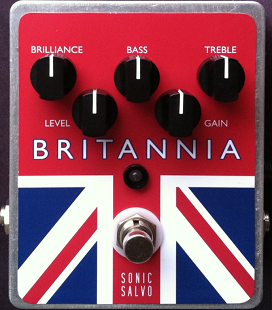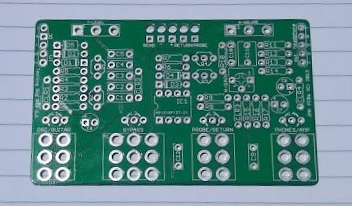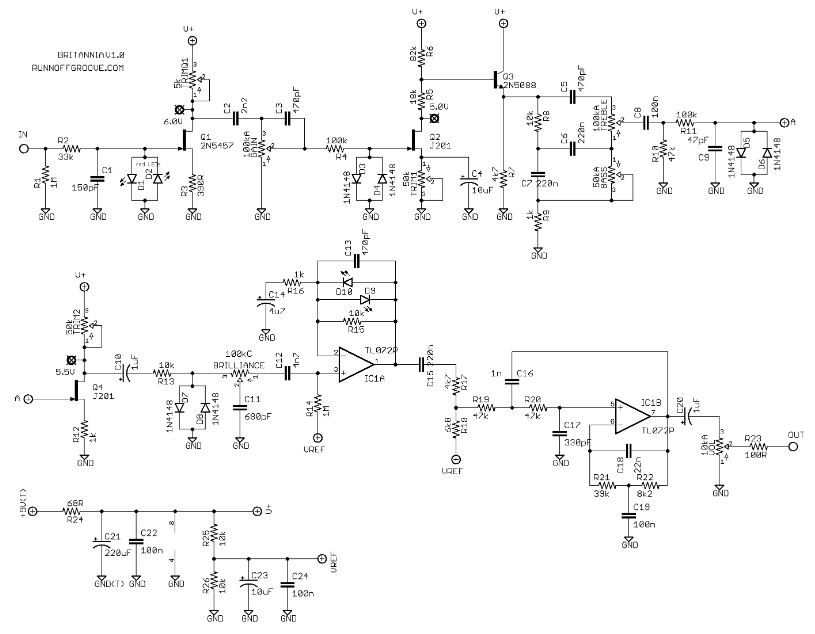Difference between revisions of "Britannia"
m |
(→Build Details) |
||
| (16 intermediate revisions by 2 users not shown) | |||
| Line 2: | Line 2: | ||
| __TOC__ | | __TOC__ | ||
|} | |} | ||
| − | The | + | The Britannia is a pedal architecture developed by [http://www.runoffgroove.com RunoffGroove.com ]for the purpose of building a sound-alike pedal of the [[Vox]] [[AC-30]] with Top Boost amplifier. [[1776 Effects]] developed the printed circuit board(PCB) to match the schematic developed by ROG. |
Thermionic Studios has purchased this PCB and sourced the parts necessary to build this pedal. We are in the process of building the pedal and will have more to report upon completion. | Thermionic Studios has purchased this PCB and sourced the parts necessary to build this pedal. We are in the process of building the pedal and will have more to report upon completion. | ||
| + | |||
| + | ; Thermionic Studios has one(1) Britannia. When we finish assembling it, it will be available for rental | ||
==Controls== | ==Controls== | ||
| − | * Knob 1 - ''' | + | [[File:1776_Britannia_front.png|right|frame|<div style="text-align:right">Image from [http://www.runoffgroove.com/britannia.html Runoff Groove Britannia page]<br>Note Bass & Treble controls are mislabeled.</div>]] |
| − | * Knob 2 - ''' | + | |
| − | * Knob 3 - ''' | + | * Knob 1 - '''"Brilliance":''' Sets the amount of treble '''after''' the preamp section, increasing treble as control is turned clockwise. |
| − | * Knob 4 - '''Gain:''' Sets the amount of overdrive in the preamp section, increasing as | + | * Knob 2 - '''"Volume":''' This knob sets the output level of the pedal with the total volume increasing as the control is turned clockwise. |
| − | * Knob 5 - ''' | + | * Knob 3 - '''"Treble":''' Works like an AC/30 amp by boosting treble and upper midrange while cutting bass as the knob is turned clockwise. |
| − | * Footswitch 1 - '''"On/Off":''' This switch toggles the effect on | + | * Knob 4 - '''"Gain":''' Sets the amount of overdrive in the preamp section, increasing the gain as the knob is turned clockwise. |
| + | * Knob 5 - '''"Bass":''' Sets the amount of bass frequencies in the signal with most bass available when control is fully clockwise. | ||
| + | * Footswitch 1 - '''"On/Off":''' This switch toggles the effect between "off" (bypass) and "on" (active). | ||
| + | |||
| + | ==Bypass: True== | ||
| + | The Brittania is a true bypass pedal. | ||
==General Information== | ==General Information== | ||
http://1776effects.com/wp-content/uploads/2015/03/Britannia-BOM.pdf | http://1776effects.com/wp-content/uploads/2015/03/Britannia-BOM.pdf | ||
| − | The | + | The Britannia can be powered by a 9-volt battery, or a tip-negative Boss-style 9-volt power adapter. The transistors must be biased correctly for this pedal, sound-wise, to sound as accurate as possible to an actual [[Vox]] [[AC/30]] amplifier. |
==Pedal Manual== | ==Pedal Manual== | ||
| − | As of this time, | + | As of this time, 1776 Effects has not issued a separate manual on how to use the pedal. The best references are either this wiki page, the entry on the Runoff Groove website, or the build manual from 1776 Effects which describes the architecture of the pedal. |
| − | + | Runoff Groove offers the following advice when attempting to use the Britannia with a treble booster: | |
<blockquote> | <blockquote> | ||
| Line 30: | Line 37: | ||
</blockquote> | </blockquote> | ||
| − | ==Phase Inversion== | + | == Build Details == |
| − | From our examination of the schematic below, the | + | In the instance where this is a pedal built by Thermionic Studios, provide the specifics of the build in this section here. In the instance of a production pedal, either post an image of the completed PCB of the production in the enclosure, or remove this page section entirely. |
| + | |||
| + | [[File:JMKPCBs_TestingRig_PCB.png|center|frame|<div style="text-align:right">JMKPCBs Testing Rig PCB</div>]] | ||
| + | <center> | ||
| + | {| class="wikitable" style="center; margin-right:20px; background-color:#eeffee;" cellpadding="10" | ||
| + | |- | ||
| + | ! Item || Value | ||
| + | |- | ||
| + | | '''''PCB Creator''''' || (PCB Creator) | ||
| + | |- | ||
| + | | PCB Dimensions || length X width (metric)<br>length x width (SAE) | ||
| + | |- | ||
| + | | Enclosure Size || Hammond 1590(!!)/1550(!!) | ||
| + | |- | ||
| + | | Enclosure Orientation || Portrait / Landscape | ||
| + | |- | ||
| + | | Power Adapter || 9 volts, Standard Boss "barrel-negative" supply <br>9-volt battery snap available | ||
| + | |- | ||
| + | | Power Consumption || 'XXX' milliamps | ||
| + | |} | ||
| + | </center> | ||
| + | |||
| + | ==Phase Inversion: Yes== | ||
| + | From our examination of the schematic below, the Britannia appears to invert phase on the output as compared with the signal that goes into the pedal. | ||
{| class="wikitable" style="left; margin-right:20px; background-color:#eeffee;" cellpadding="10" | {| class="wikitable" style="left; margin-right:20px; background-color:#eeffee;" cellpadding="10" | ||
|- | |- | ||
| − | ! Electronic Part || Action || Phase State | + | ! Schematic ID ||Electronic Part || Action || Phase State |
|- | |- | ||
| − | | Q1 || Inverts || Inverted | + | | Q1 || 2N5457 || Inverts || Inverted |
|- | |- | ||
| − | | Q2 || Inverts || Reverted | + | | Q2 || J201 || Inverts || Reverted |
|- | |- | ||
| − | | Q3 || Does not Invert || Reverted | + | | Q3 || 2N5088 || Does not Invert || Reverted |
|- | |- | ||
| − | | Q4 || Inverts || Inverted | + | | Q4 || J201 || Inverts || Inverted |
|- | |- | ||
| − | | IC1a || Does not Invert || Inverted | + | | IC1a || TL072 || Does not Invert || Inverted |
|- | |- | ||
| − | | IC1b || Does not Invert || Inverted | + | | IC1b || TL072 || Does not Invert || Inverted |
|} | |} | ||
| Line 56: | Line 86: | ||
==Artists== | ==Artists== | ||
| − | + | We are currently unaware of any artists actively using the pedal now, or who have in the past. | |
| + | <div style="column-count:3;-moz-column-count:3;-webkit-column-count:3"> | ||
| + | </div> | ||
---- | ---- | ||
;Additional Sources | ;Additional Sources | ||
| + | # http://www.runoffgroove.com/britannia.html | ||
| Line 65: | Line 98: | ||
[[Category:Overdrive Pedals]] | [[Category:Overdrive Pedals]] | ||
[[Category:PCB-Only Pedals]] | [[Category:PCB-Only Pedals]] | ||
| − | [[Category: | + | [[Category:1776 Pedals]] |
[[Category:Thermionic Pedals]] | [[Category:Thermionic Pedals]] | ||
Latest revision as of 03:02, 11 January 2026
The Britannia is a pedal architecture developed by RunoffGroove.com for the purpose of building a sound-alike pedal of the Vox AC-30 with Top Boost amplifier. 1776 Effects developed the printed circuit board(PCB) to match the schematic developed by ROG.
Thermionic Studios has purchased this PCB and sourced the parts necessary to build this pedal. We are in the process of building the pedal and will have more to report upon completion.
- Thermionic Studios has one(1) Britannia. When we finish assembling it, it will be available for rental
Controls

Note Bass & Treble controls are mislabeled.
- Knob 1 - "Brilliance": Sets the amount of treble after the preamp section, increasing treble as control is turned clockwise.
- Knob 2 - "Volume": This knob sets the output level of the pedal with the total volume increasing as the control is turned clockwise.
- Knob 3 - "Treble": Works like an AC/30 amp by boosting treble and upper midrange while cutting bass as the knob is turned clockwise.
- Knob 4 - "Gain": Sets the amount of overdrive in the preamp section, increasing the gain as the knob is turned clockwise.
- Knob 5 - "Bass": Sets the amount of bass frequencies in the signal with most bass available when control is fully clockwise.
- Footswitch 1 - "On/Off": This switch toggles the effect between "off" (bypass) and "on" (active).
Bypass: True
The Brittania is a true bypass pedal.
General Information
http://1776effects.com/wp-content/uploads/2015/03/Britannia-BOM.pdf
The Britannia can be powered by a 9-volt battery, or a tip-negative Boss-style 9-volt power adapter. The transistors must be biased correctly for this pedal, sound-wise, to sound as accurate as possible to an actual Vox AC/30 amplifier.
Pedal Manual
As of this time, 1776 Effects has not issued a separate manual on how to use the pedal. The best references are either this wiki page, the entry on the Runoff Groove website, or the build manual from 1776 Effects which describes the architecture of the pedal.
Runoff Groove offers the following advice when attempting to use the Britannia with a treble booster:
If you would like to use a treble booster at the input of Britannia like Brian May did into the AC-30 Normal channel, we recommend that you start with the following configuration: set the Bass control at maximum, the Treble control at minimum, and the Brilliance control at noon; adjust the Gain control as desired, and then fine-tune the sound to your liking with the Bass, Treble and Brilliance controls. Use of a flat or full frequency booster in front of Britannia will also produce some interesting sounds.
Build Details
In the instance where this is a pedal built by Thermionic Studios, provide the specifics of the build in this section here. In the instance of a production pedal, either post an image of the completed PCB of the production in the enclosure, or remove this page section entirely.
| Item | Value |
|---|---|
| PCB Creator | (PCB Creator) |
| PCB Dimensions | length X width (metric) length x width (SAE) |
| Enclosure Size | Hammond 1590(!!)/1550(!!) |
| Enclosure Orientation | Portrait / Landscape |
| Power Adapter | 9 volts, Standard Boss "barrel-negative" supply 9-volt battery snap available |
| Power Consumption | 'XXX' milliamps |
Phase Inversion: Yes
From our examination of the schematic below, the Britannia appears to invert phase on the output as compared with the signal that goes into the pedal.
| Schematic ID | Electronic Part | Action | Phase State |
|---|---|---|---|
| Q1 | 2N5457 | Inverts | Inverted |
| Q2 | J201 | Inverts | Reverted |
| Q3 | 2N5088 | Does not Invert | Reverted |
| Q4 | J201 | Inverts | Inverted |
| IC1a | TL072 | Does not Invert | Inverted |
| IC1b | TL072 | Does not Invert | Inverted |
This will need to be borne out by testing and observation.
Schematic
Artists
We are currently unaware of any artists actively using the pedal now, or who have in the past.
- Additional Sources

